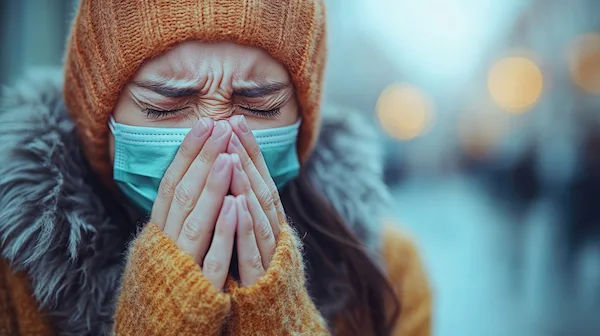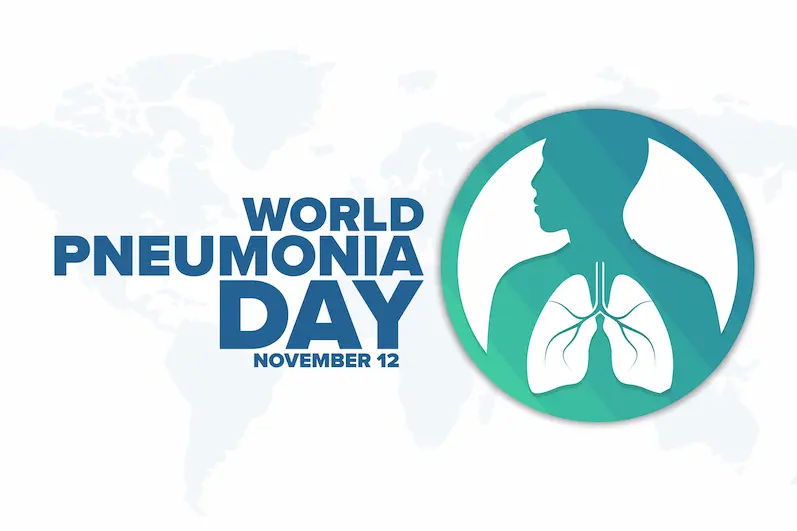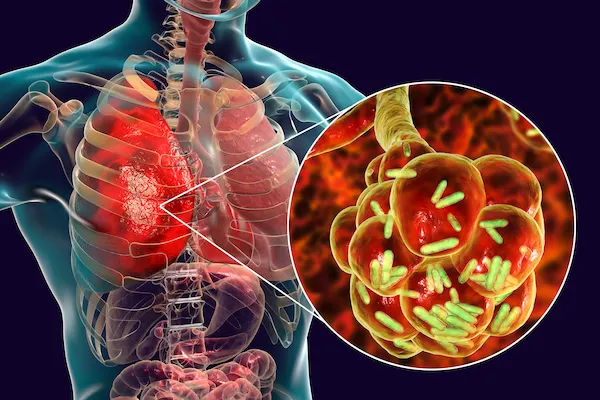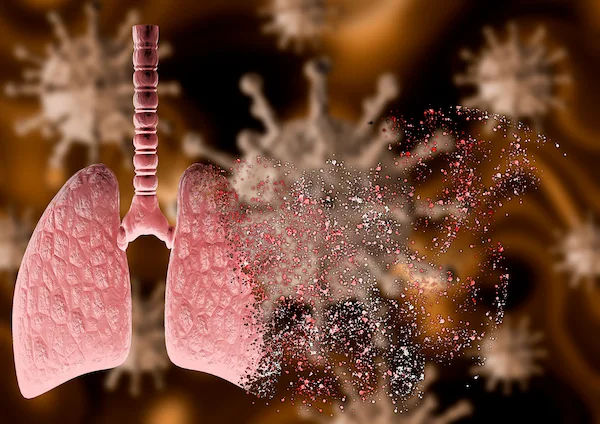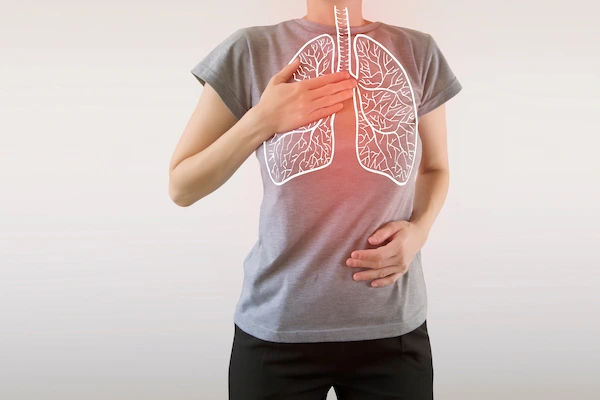Your Winter Guide to Pneumonia: Symptoms, Prevention, and Care
Know about pneumonia, how it differs from a cold, why common in winter, symptoms, causes, diagnosis and treatment strategies. Learn about the hygiene and lifestyle habits for pneumonia prevention.

Written by Dr. Shaik Abdul Kalam
Reviewed by Dr. Mohammed Kamran MBBS, FIDM
Last updated on 13th Jan, 2026
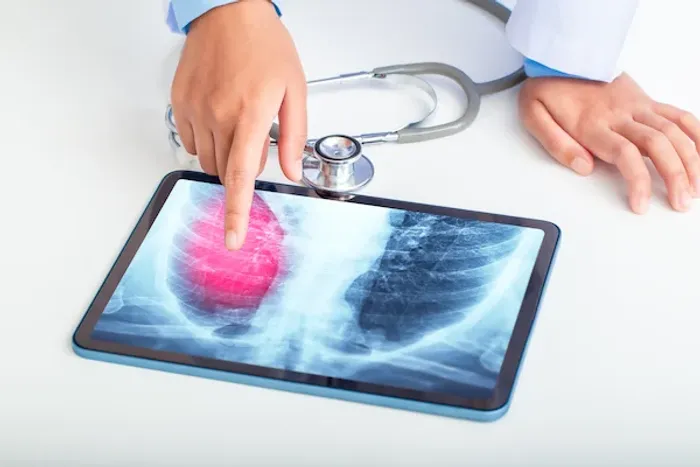
Introduction
As the winter chill sets in, we often bundle up to guard against the common cold and flu. However, a more serious respiratory illness tends to peak during these colder months: pneumonia. This lung infection can range from mild to life-threatening, making it crucial to understand its signs, especially when it's most prevalent. This comprehensive guide will walk you through everything you need to know about pneumonia, from what it is and why it's a common illness in winter to how you can effectively prevent and address it. Whether you're looking to protect yourself, a child, or an elderly family member, this article will equip you with the knowledge to navigate this season with greater confidence and health awareness.
What Exactly is Pneumonia?
Pneumonia is an infection that causes inflammation in the air sacs (alveoli) of one or both lungs. These sacs can fill with fluid or pus, leading to a productive cough with phlegm, fever, chills, and difficulty breathing. A variety of organisms, including bacteria, viruses, and fungi, can cause this common illness. It's not just a severe cold; it's a condition that directly impacts the vital function of your lungs, making it potentially serious for infants, young children, older adults, and people with compromised immune systems.
How Pneumonia Differs from a Common Cold or Flu
While a cold or flu affects your upper respiratory system (nose, throat, sinuses), pneumonia settles deeper in your lungs. A key differentiator is the duration and severity of symptoms. A cold typically improves within a week, and the flu, while brutal, often subsides in a similar timeframe. Pneumonia, however, can cause a lingering cough and fatigue for weeks. The presence of a high fever, sharp chest pain that worsens when you breathe or cough, and significant shortness of breath are red flags that point more toward pneumonia than a standard winter virus.
Health topic carousel:
Doctor speciality: General Practitioner
Text: Consult a Top General Practitioner for Personalised Advice
Why is Pneumonia More Common in Winter?
The spike in pneumonia cases during winter isn't a coincidence. It's a result of several environmental and behavioural factors that create a perfect storm for respiratory infections.
Indoor Crowding and Increased Virus Transmission
Colder weather drives people indoors, where they are in closer contact with others. This confined environment makes it easier for germs to spread through coughs, sneezes, or even talking. Many cases of viral pneumonia begin as influenza (the flu). When flu season peaks in winter, the number of potential pneumonia cases rises accordingly.
Cold Air's Impact on Your Respiratory Defenses
Breathing in cold, dry air can actually weaken your respiratory system's natural defenses. The hairs and mucus in your nasal passages and airways, which trap and remove germs, work less effectively in cold conditions. This makes it easier for pathogens to travel down into your lungs and cause an infection.
Recognising the Symptoms: Don't Ignore the Signs
Early recognition of pneumonia symptoms is critical for prompt treatment. The signs can vary from mild to severe, depending on the cause, your age, and your overall health.
Common Symptoms in Adults
In adults, classic signs of pneumonia often include:
A productive cough that brings up mucus (which may be green, yellow, or even bloody)
Fever, sweating, and shaking chills
Shortness of breath or rapid, shallow breathing
Sharp or stabbing chest pain that worsens with deep breathing or coughing
Loss of appetite, low energy, and extreme fatigue
Confusion, particularly in older adults
Pneumonia Symptoms in Children and Infants
Children may show similar symptoms, but parents should be extra vigilant for:
Fast or laboured breathing
A fever and cough
Wheezing
Signs of dehydration (fewer wet nappies)
In infants, lethargy, grunting, or difficulty feeding are critical warning signs.
Severe Symptoms That Require Immediate Medical Attention
If you or a loved one experiences any of the following, seek emergency care:
Struggling to breathe or severe shortness of breath.
A bluish tint to the lips or fingertips (cyanosis) indicates low oxygen levels.
High fever (103°F or 39.4°C or higher).
Sudden confusion or disorientation.
If you are observing severe symptoms like these, it is crucial to consult a doctor immediately. You can book a priority consultation with a specialist on Apollo24|7 to get timely advice.
The Various Causes of Pneumonia
Understanding the cause of pneumonia is essential for determining the right treatment. The infection is categorised based on the germ that causes it.
Bacterial Pneumonia (The Most Common Bacterial Cause)
The bacterium Streptococcus pneumoniae is the most frequent cause of community-acquired bacterial pneumonia. It can occur on its own or after you've had a cold or the flu. This type often affects one lobe of the lung and is typically treated with antibiotics.
Viral Pneumonia (Often a Post-Flu Complication)
Respiratory viruses, particularly influenza (flu), RSV, and SARS-CoV-2 (the virus that causes COVID-19), are common culprits, especially in children. Viral pneumonia is usually less severe than bacterial forms but can weaken the lungs, making a person susceptible to a secondary bacterial infection. Antiviral medications may be used in some cases.
Fungal and Walking Pneumonia
Fungal pneumonia is rare and usually affects people with chronic health problems or weakened immune systems. "Walking pneumonia" is an informal term for a mild case of pneumonia, often caused by bacteria like Mycoplasma pneumoniae. People with it may not feel sick enough to stay in bed, hence the name.
Are You at a Higher Risk?
Certain groups are more vulnerable to developing severe pneumonia. These include:
Infants and children under 2 years old, whose immune systems are still developing.
Adults aged 65 and older.
People with chronic diseases like asthma, COPD, heart disease, or diabetes.
Individuals with weakened immune systems due to HIV/AIDS, chemotherapy, or organ transplants.
Smokers, as smoking damages the lungs' natural defenses.
How is Pneumonia Diagnosed?
If pneumonia is suspected based on your symptoms, a doctor will perform a few checks to confirm the diagnosis.
The Role of Physical Examination and Listening to Your Lungs
The doctor will use a stethoscope to listen to your lungs. Crackling, bubbling, or rumbling sounds are often indicative of pneumonia.
Diagnostic Tests: From Chest X-rays to Blood Tests
Chest X-ray: This is the primary test to confirm the presence and location of the infection in your lungs.
Blood Tests: These can help identify whether the infection is bacterial or viral and assess the severity.
Sputum Test: A sample of mucus from your lungs (sputum) may be analysed to pinpoint the specific germ.
For necessary diagnostic tests like a Chest X-ray or blood work, Apollo24|7 offers convenient home collection services, allowing you to get tested without leaving your house, which is especially beneficial when you are feeling unwell.
Health topic carousel:
Lab test: Chest X-ray, Blood Test & Sputum Test
Text: Get Your Symptoms Assessed
Effective Treatment Strategies for Pneumonia
The treatment plan depends entirely on the cause and severity of your pneumonia.
Treating Bacterial vs. Viral Pneumonia
Bacterial pneumonia is treated with antibiotics. It's vital to complete the entire course, even if you start feeling better. Viral pneumonia does not respond to antibiotics. Treatment focuses on rest, fluids, and symptom management. In some cases, antiviral drugs may be prescribed.
The Crucial Role of Supportive Home Care
Whether your case is mild or you're recovering from a more severe episode, home care is essential.
Get plenty of rest to help your body fight the infection.
Stay hydrated by drinking water, broth, and herbal tea to loosen mucus and prevent dehydration.
Manage fever and pain with over-the-counter medications like acetaminophen or ibuprofen (as advised by your doctor).
Use a humidifier to ease breathing and calm a cough.
When Hospitalisation Might Be Necessary
Severe cases, especially in high-risk individuals, may require hospitalisation for:
Intravenous (IV) antibiotics and fluids.
Oxygen therapy to maintain healthy blood oxygen levels.
Breathing treatments.
Your Best Defense: Proactive Prevention of Pneumonia
Prevention is always better than cure, and this is especially true for pneumonia.
Vaccination: Your First Line of Defense
Vaccines are the most effective way to prevent pneumonia. Key vaccines include:
Pneumococcal vaccine: Protects against the most common bacterial cause.
Flu shot: Since the flu is a common precursor to pneumonia, getting an annual flu vaccine is critical.
COVID-19 vaccine: Helps prevent pneumonia caused by the SARS-CoV-2 virus.
Talk to your doctor about which vaccines are appropriate for you and your family.
Lifestyle Habits to Strengthen Your Immunity
Don't smoke, and avoid secondhand smoke.
Eat a balanced diet rich in fruits and vegetables.
Exercise regularly and get adequate sleep.
Manage stress effectively.
Hygiene Practices to Stop the Spread of Germs
Wash your hands frequently with soap and water.
Use alcohol-based hand sanitiser when soap isn't available.
Cover your mouth and nose with a tissue or your elbow when you cough or sneeze.
Regularly disinfect frequently touched surfaces.
Conclusion
Pneumonia is a significant health concern, particularly during the winter months, but it is not an invincible foe. By understanding its causes, recognising its symptoms early, and adopting proactive prevention strategies, you can significantly reduce your risk. Remember that listening to your body is key—what might start as a simple cold can sometimes develop into something more serious. Prioritise your health by staying up-to-date on vaccinations, practising good hygiene, and maintaining a healthy lifestyle. Most importantly, never hesitate to seek professional medical advice if you are concerned about your symptoms. If your condition does not improve after trying home care methods, or if you have underlying health issues, consult a doctor online with Apollo24|7 for a comprehensive evaluation and personalised care plan.
Health topic carousel:
Doctor speciality: General Practitioner
Text: Consult a Top General Practitioner for Personalised Advice
Consult Top Specialists for Personalised Tips

Dr. Debdatta Pati
Psychiatrist
18 Years • MBBS, DPM, MD (PSYCHIATRY)
Kolkata
MCR SUPER SPECIALITY POLY CLINIC & PATHOLOGY, Kolkata

Dr. Ashita Kuruvilla
General Practitioner
7 Years • MBBS
Kolkata
KVC CLINIC, Kolkata

Dr. Debajyoti Goswami
Obstetrician and Gynaecologist
10 Years • MBBS,D.G.O(DNB),Adv. Infertility Tech.(AIIMS),Fellowship in Diabetes(U.K),Comprehensive Abortion Care(Govt. Of W.B), Certificate in Clinical Embryology(AIIMS, BHUBANESWAR)
Bankura
D.G Clinic, Bankura
(25+ Patients)

Dr Syed Mateen Pasha
General Physician
2 Years • MBBS
Bengaluru
PRESTIGE SHANTHINIKETAN - SOCIETY CLINIC, Bengaluru
Dr. Rubina Fatima
General Practitioner
1 Years • MBBS MD (Forensic Medicine)
Hyderabad
Dr Rubina Fatima Clinic, Hyderabad
Consult Top Specialists

Dr. Debdatta Pati
Psychiatrist
18 Years • MBBS, DPM, MD (PSYCHIATRY)
Kolkata
MCR SUPER SPECIALITY POLY CLINIC & PATHOLOGY, Kolkata

Dr. Ashita Kuruvilla
General Practitioner
7 Years • MBBS
Kolkata
KVC CLINIC, Kolkata

Dr. Debajyoti Goswami
Obstetrician and Gynaecologist
10 Years • MBBS,D.G.O(DNB),Adv. Infertility Tech.(AIIMS),Fellowship in Diabetes(U.K),Comprehensive Abortion Care(Govt. Of W.B), Certificate in Clinical Embryology(AIIMS, BHUBANESWAR)
Bankura
D.G Clinic, Bankura
(25+ Patients)

Dr Syed Mateen Pasha
General Physician
2 Years • MBBS
Bengaluru
PRESTIGE SHANTHINIKETAN - SOCIETY CLINIC, Bengaluru
Dr. Rubina Fatima
General Practitioner
1 Years • MBBS MD (Forensic Medicine)
Hyderabad
Dr Rubina Fatima Clinic, Hyderabad
More articles from Pneumonia
Frequently Asked Questions
How long does it take to recover from pneumonia?
Recovery time varies. Young, healthy people may feel better in a week, while fatigue and a cough can linger for a month or longer in others. Full recovery for older adults or those with other illnesses can take several weeks.
Is pneumonia contagious?
Yes, pneumonia itself is not always directly contagious, but the bacteria and viruses that cause it are. You can catch the germ from an infected person, but it may lead to a cold or flu instead of pneumonia, depending on your health.
What is the best antibiotic for pneumonia?
There is no single 'best' antibiotic. The choice depends on the specific bacteria, your age, health, and local resistance patterns. A doctor will prescribe the most appropriate one. Common ones include amoxicillin and azithromycin.
What are the symptoms of walking pneumonia?
Walking pneumonia symptoms are typically mild and can be mistaken for a bad cold. They include a persistent dry cough, low-grade fever, headache, and fatigue. People often remain active, hence the name.
What is the difference between bronchitis and pneumonia?
Both affect the lungs, but bronchitis is an inflammation of the bronchial tubes (airways), while pneumonia is an infection in the air sacs (alveoli) themselves. Pneumonia is generally more severe and can cause a higher fever and more significant shortness of breath.
